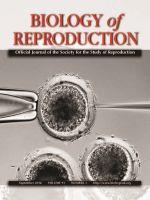Physiology of the adult can be modified by alterations in prenatal development driven by the maternal environment. Developmental programming, which can be established before the embryo implants in the uterus, can affect females differently than males. The mechanism by which sex-specific developmental programming is established is not known. Here we present evidence that maternal regulatory signals change female embryos differently than male embryos. In particular, actions of the maternally derived cytokine CSF2 from Day 5 to Day 7 of development affected characteristics of the embryo at Day 15 differently for females than males. CSF2 decreased length and IFNT secretion of female embryos but increased length and IFNT secretion of male embryos. Analysis of a limited number of samples indicated that changes in the transcriptome and methylome caused by CSF2 also differed between female and males. Thus, sex-specific programming by the maternal environment could occur when changes in secretion of maternally derived regulatory molecules alter development of female embryos differently than male embryos.
How to translate text using browser tools
30 July 2014
Sexual Dimorphism in Developmental Programming of the Bovine Preimplantation Embryo Caused by Colony-Stimulating Factor 2
Kyle B. Dobbs,
Dominic Gagné,
Eric Fournier,
Isabelle Dufort,
Claude Robert,
Jeremy Block,
Marc-André Sirard,
Luciano Bonilla,
Alan D. Ealy,
Barbara Loureiro,
Peter J. Hansen
ACCESS THE FULL ARTICLE

Biology of Reproduction
Vol. 91 • No. 3
September 2014
Vol. 91 • No. 3
September 2014
bovine
colony-stimulating factor 2
cytokines
DNA methylation
early development
embryo
epigenetics




